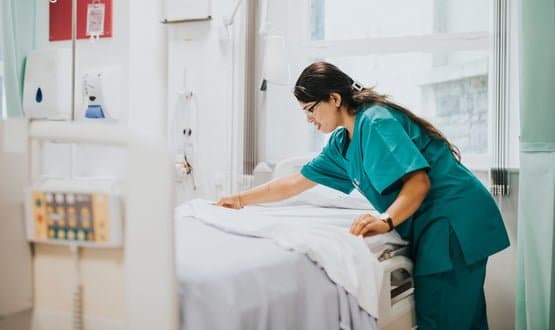Covid-19: NHS to trial digital passports to free up staff movement
- 31 March 2020

NHS England and Improvement are to begin trials of digital ‘staff passports’ in the coming weeks to make it easier for healthcare workers to move between organisations during the coronavirus pandemic.
The temporary passports, which will be stored on staff members’ smartphones, will contain a “minimum set of verified credentials” that will allow them to be deployed to different NHS sites “quickly and without unnecessary bureaucracy”.
Part of the Enabling Staff Movement Toolkit launched in July 2019, the initiative has been fast-tracked to make it easier for the NHS to allocate staff to pressure points, as it braces itself for unprecedented demand caused by Covid-19.
Guidance on NHS Employers states: “The toolkit mitigates the requirement for staff to undergo employment checks such as health clearance or DBS checks; core skills training; and induction with every host organisation. Instead, parties to the agreement will accept checks undertaken by co-signatories so that an individual staff member can begin work quickly.
“Therefore, there will be no requirement for you to create a separate workforce sharing agreement if you don’t yet have one, and the digital passport with an embedded licence to attend will be available to participating employers nationally.”
Digital passport systems are already in use at some NHS trusts. Kings Health Partners has had a system in place since 2010 which allows staff from King’s College London, King’s College Hospital NHS Foundation Trust, Guy’s and St Thomas’ NHS Foundation Trust and South London and Maudsley NHS Foundation Trust to move between member organisations.
The wider programme by NHS England and Improvement aims to expand this to all NHS organisations, with the aim of making it easier for staff to rotate more easily between trusts while reducing onboarding and HR processes.
The guidance continues: “To help human resource directors and workforce leaders across the health system with plans to respond to COVID-19, the resources we have collated deal with the workforce issues that are likely to arise during the current pandemic.
Health and social care will come under significant pressure during the pandemic and will face very high demands for both admission of emergency cases for treatment, including critical care, and access to primary care services. At the same time, health and care staff and their families may also be infected, creating higher than usual sickness absence or caring issues.
“This will put significant pressure on resources, including staff. This guidance will help employers protect and support their workforce, use their workforce in the most effective way and enable them to recruit additional support as quickly as possible from returning staff, volunteers and students in training.”
Mobilising the volunteer sector
Additional efforts are underway to help alleviate the tremendous pressure on NHS staff as the infection rate of coronavirus increases.
Last week, the NHS Volunteer Responders initiative was set up in an attempt to recruit 250,000 volunteers to support the most vulnerable and those most at risk from Covid-19.
Volunteers are being recruited through the GoodSAM app and can support the NHS by helping to deliver medicines, drive patients to and from appointments and check up on people who are self-isolating.
Digital Health Unplugged has recorded a special coronavirus edition of the podcast to keep you up-to-date on the latest news from the NHS and suppliers as the outbreak continues. You can tune in on Spotify, iTunes and Apple Podcasts as well as on Digital Health News.




